
The review, promotion, and tenure (RPT) process is central to academic life and workplace advancement. It influences where faculty direct their attention, research, and publications. By unveiling the RPT process, we can inform actions that lead towards a greater opening of research.







